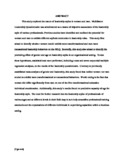GENDER DIFFERENCES IN OCCUPATIONAL LEADERSHIP STYLES
Author
Moore, Susan Williams
Abstract
This study explored the nature of leadership styles in women and men. Multifactor Leadership Questionnaire was administered as a means of objective assessment of the leadership style of various professionals. Previous studies have identified and outlined the potential for women and men to exhibit different stylistic tendencies in leadership roles. This study first aimed to identify whether women would exhibit more transformational and men more transactional leadership behaviors on the MLQ. Secondly, this study also aimed to identify the predicting effect of gender and age on leadership styles in an organizational setting. To test these hypotheses, statistical tests were performed, including t-tests and seven sequential multiple regression analyses, on the results of the leadership questionnaire. Contrary to previously established meta-analyses of gender and leadership, this study found that neither women nor men tended to exhibit more transformational or transactional behaviors. Worth noting is the fact that women did differ significantly from men on one of the five transformational subscales: individual consideration. Additionally, this study's results found no predictive capacity of age for leadership style. The need for further research into the leadership styles of professionals of various ages and at different levels in their field may in turn help streamline professional training standards and the expectations of different individuals in supervising capacities within a business setting.
Date
2012
Citation:
APA:
Moore, Susan Williams.
(January 2012).
GENDER DIFFERENCES IN OCCUPATIONAL LEADERSHIP STYLES
(Master's Thesis, East Carolina University). Retrieved from the Scholarship.
(http://hdl.handle.net/10342/3824.)
MLA:
Moore, Susan Williams.
GENDER DIFFERENCES IN OCCUPATIONAL LEADERSHIP STYLES.
Master's Thesis. East Carolina University,
January 2012. The Scholarship.
http://hdl.handle.net/10342/3824.
June 29, 2024.
Chicago:
Moore, Susan Williams,
“GENDER DIFFERENCES IN OCCUPATIONAL LEADERSHIP STYLES”
(Master's Thesis., East Carolina University,
January 2012).
AMA:
Moore, Susan Williams.
GENDER DIFFERENCES IN OCCUPATIONAL LEADERSHIP STYLES
[Master's Thesis]. Greenville, NC: East Carolina University;
January 2012.
Collections
Publisher
East Carolina University

